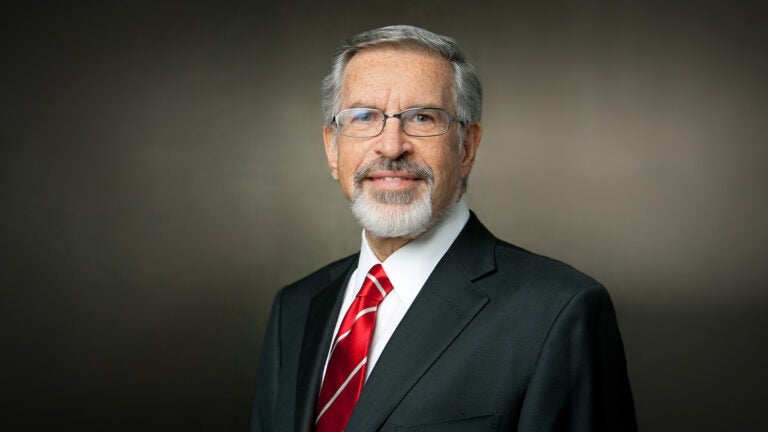
Leonard D. Schaeffer is the namesake of the new USC Schaeffer Institute for Public Policy & Government Service.(Photo/Rex Gelert)
USC announces new Leonard D. Schaeffer Institute for Public Policy & Government Service
Leonard and Pamela Schaeffer’s $59 million gift establishes a new institute that will address multiple public policy issues with evidence-based research and educate new generations of scholars to help solve our nation’s policy challenges.
Leonard D. Schaeffer and his wife, Pamela, have donated $59 million to establish the USC Leonard D. Schaeffer Institute for Public Policy & Government Service, which will be anchored at USC and in the university’s new Capital Campus in Washington, D.C., university President Carol Folt announced today. The mission of the new institute is to produce research that informs evidence-based policymaking to address our nation’s most pressing issues and to educate students to be responsible and involved citizens of a true, functioning democracy.
By expanding two outstanding programs — the USC Schaeffer Center for Health Policy & Economics and the Leonard D. Schaeffer Fellows in Government Service — USC’s new institute will be able to significantly increase its scope, size, and national and international impact.
“The newly formed Schaeffer Institute accelerates USC’s capacity to develop effective academic leaders and to forge critical high-impact partnerships with influential policymakers and organizations,” Folt said.
“There are times in the life of a university when a vision and an opportunity align to become a powerful force to serve the public good.” Folt continued, “And our students and our nation need this now more than ever.”
Folt expressed gratitude to Leonard D. Schaeffer, a longtime member of the USC Board of Trustees. “This bold and lasting commitment by the Schaeffers advances their life’s passion to impact policy that improves people’s lives and educate students to be responsible and involved citizens,” she said.

The Leonard D. Schaeffer Institute for Public Policy & Government Service is the first major research and education facility to be headquartered at the USC Capital Campus in Washington, D.C., which Folt opened in Dupont Circle last spring.
Schaeffer said the new institute has the potential to have a long-lasting impact at a time when the United States needs it most.
“Our country is experiencing a series of challenges that are unique in our history,” he said. “We are facing many difficult issues around the world — climate change, pandemics, violent conflicts in Europe and the Middle East, and world trade and economic problems, to name a few. Here at home, we are experiencing the loss of faith in science and government. The institute will have the faculty, students and postdocs to provide the analysis and facts necessary to counter erosion in public discourse and promote more effective policy solutions.”
Folt said the institute will establish a permanent presence for the university and serve as a launching pad for interdisciplinary researchers and policy experts to address national and global challenges in close collaboration with leading government and academic institutions. USC will accomplish this by bringing together the knowledge and expertise of all 23 USC schools in a coordinated and strategic way.
Folt also thanked Schaeffer for his trusted advice, support and counsel. She said Schaeffer has proven repeatedly that “he always answers the call and gives his all with spirit, full attention, knowledge, a formidable library of experience, and commitment to success and impact in everything.”
The gift for the institute is the Schaeffers’ single largest to the university. Previously, the couple founded several chaired professorships. In 2009, a significant gift established the namesake USC Schaeffer Center for Health Policy & Economics, where scholars produce innovative research. In 2015, the Schaeffers funded the Schaeffer Fellows in Government Service program.
The Schaeffer Center ranks among the nation’s premier centers focused on health policy. For more than a decade, policymakers and stakeholders in Congress, the Centers for Medicare & Medicaid Services, the Government Accountability Office, the White House, the National Institutes of Health and other government entities have relied on Schaeffer Center research to inform their decision making.
“The Schaeffer Center has helped shape health policy through a rigorous, independent research model that can be applied to other academic disciplines. Meanwhile, the Schaeffer Fellows in Government Service [program] has prepared some of our nation’s brightest students to become more informed and engaged citizens,” Schaeffer said. “Housing the center and fellows program within a single institute extends their benefits to a wider group of scholars and students and will enhance USC’s ability to promote fact-based decisions that are essential to democracy.”
Schaeffer Center researchers have influenced public discourse about both health care system challenges and proposals to solve them. Policymakers have taken notice, seeking testimony from center experts and citing their findings in their policy discussions. They have testified before Congress about gaps in patients’ access and ability to afford health care. For instance, center investigators developed a portfolio of research illuminating the role of intermediaries in the pharmaceutical supply chain and increasing costs. Additional research on inefficiencies in the nation’s health care system have shaped the debate on potential reforms to reduce costs and improve patient care.
“The Schaeffer Center is focused on developing evidence-based solutions that will enable the health care system to deliver quality care — at the right time and in the right setting — at a cost that is affordable for families and our nation,” Schaeffer said in the center’s 2022 annual report. “The center is committed to informing policymakers, health care stakeholders and the public about its research and recommendations in order to move our nation toward value in health for all.”
The institute in Washington, D.C.
The gift will fund the build-out of the seventh floor of the Capital Campus, which will be dedicated to the Schaeffer Institute. The institute will also have offices on the USC University Park Campus in Los Angeles.
Through the Schaeffer Institute, USC will create additional policy research programs built on the model developed by the Schaeffer Center. The physical location of the institute in Washington, D.C., will enable scholars to more easily and frequently share fact-based policy solutions with public- and private-sector leaders.
“The Schaeffer Institute will be an invaluable resource for education and scholarship, not just for Schaeffer scholars and its affiliated experts but for faculty members and students from multiple disciplines across USC,” said Dana Goldman, dean of USC Price and co-director of the USC Schaeffer Center. “Their ability to use our Capital Campus office to more easily engage with policymakers will give them far more impact.”
Public policy training
The Schaeffers’ gift also will provide an endowment for the Leonard D. Schaeffer Fellows in Government Service. This program supports paid fellowships for undergraduate students to work in local, state and federal government offices and to network with public service leaders.
“An undergraduate fellowship in government changed the course of my career and life, and I want others to have an even more enhanced opportunity,” Schaeffer said. “It is critical to educate students to be citizens who understand how government works.”
The fellowships, which are administered by USC, are open to students across USC as well as those at four other participating universities: Harvard University; Princeton University; University of California, Berkeley; and the University of Virginia. The gift will allow at least 50 students from across the five universities to participate in the fellowship every year.
The Schaeffer Institute will include the existing USC Schaeffer Center and the Leonard D. Schaeffer Fellows in Government Service. Like the center, the institute will operate in collaboration with USC Price and the USC Alfred E. Mann School of Pharmacy and Pharmaceutical Sciences.
“The Schaeffer Center is a pioneer in interdisciplinary collaboration to foster effective health policies, including addressing such crucial issues as pharmaceutical innovation and access to mental health therapies,” said Vassilios Papadopoulos, dean of USC Mann and John Stauffer Dean’s Chair in Pharmaceutical Sciences. “This new institute will widen the scope of such vital, value-focused scholarship and further build on Leonard Schaeffer’s legacy of health-policy leadership.”
Goldman will become the director of the Schaeffer Institute and will remain the co-director of the Schaeffer Center with Erin Trish, associate professor in the Department of Pharmaceutical and Health Economics at USC Mann. Goldman will step down as dean of USC Price on July 1, when the institute is scheduled to open.
Erica Lovano McCann, who currently serves as USC’s assistant vice provost for undergraduate education, will become the full-time executive director of the expanded Schaeffer Fellows in Government Service program.
Moonshots
The new institute will position USC for optimal recruitment of students and researchers whose work is aimed at influencing policy. Under Folt’s leadership, USC has been on a trajectory to advance research and expand educational opportunities within the scope of several “moonshots.”
The first, focused on health affairs, supports research that will improve health care and disease treatments. Sustainability includes both climate change-focused research and initiatives that will reduce the university’s carbon footprint. USC Competes leverages the university’s strengths in research, academics and athletics to provide access and opportunity for students and to recruit and retain top faculty and staff. Reimagining Athletics is designed to build the best athletic department in the nation that includes support for our student-athletes on and off the field and best-in-class facilities.
USC Frontiers of Computing is a $1 billion-plus initiative that aims to enhance advancements in computing and artificial intelligence research and educate generations of Trojans on the ethical development of AI, quantum computing and blockchain. This moonshot includes the opening of the new USC School of Advanced Computing within the USC Viterbi School of Engineering.
About Leonard D. Schaeffer
Leonard D. Schaeffer is one of the most accomplished leaders in American health care, with a career that spans the private, public and philanthropic sectors. He was the founding chairman and CEO of WellPoint, then the nation’s largest health benefits company by membership, and earlier he was the administrator of the federal Health Care Financing Administration (now the Centers for Medicare & Medicaid Services) with responsibility for the U.S. Medicare and Medicaid programs. He is an elected member of the National Academy of Medicine, serves as the chair of the USC Health System Board and is vice chair of the Board of Trustees at the Brookings Institution. He also served on the boards of numerous business, philanthropic and professional organizations. Schaeffer was awarded an honorary degree from USC and received the inaugural USC Sol Price Award for his lifetime achievements as a business leader, policy expert and philanthropist. He is a USC trustee and chair of the Schaeffer Center’s Board of Advisors. He also is a member of USC Price’s Board of Councilors.



